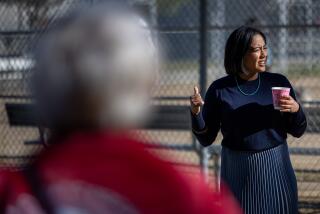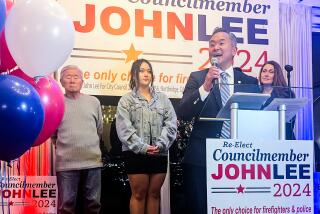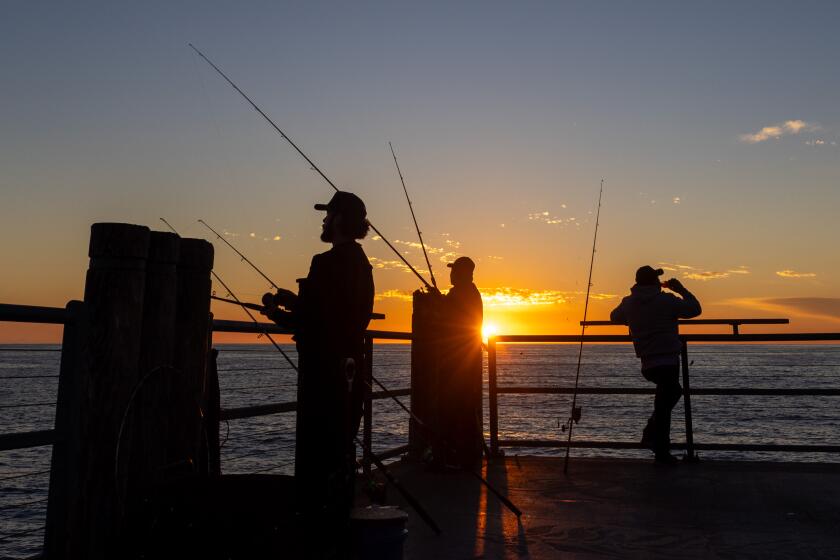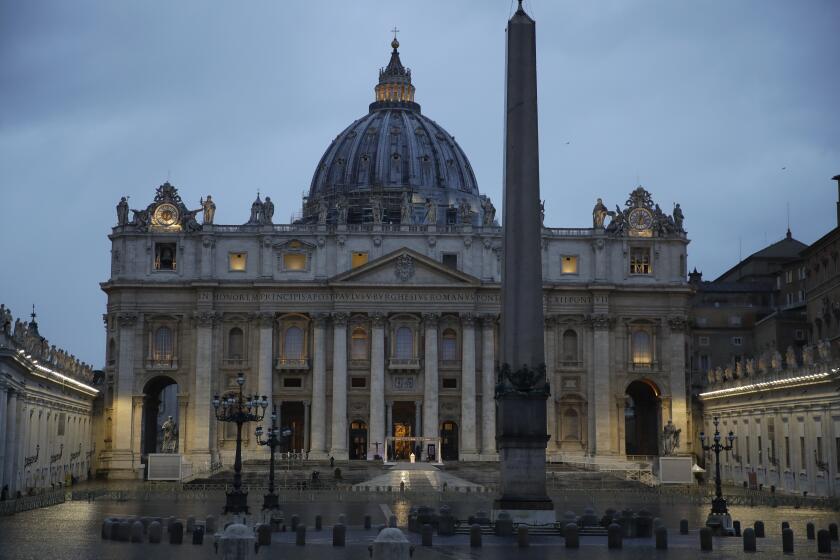South L.A. is up for revival, but how depends on next Council member
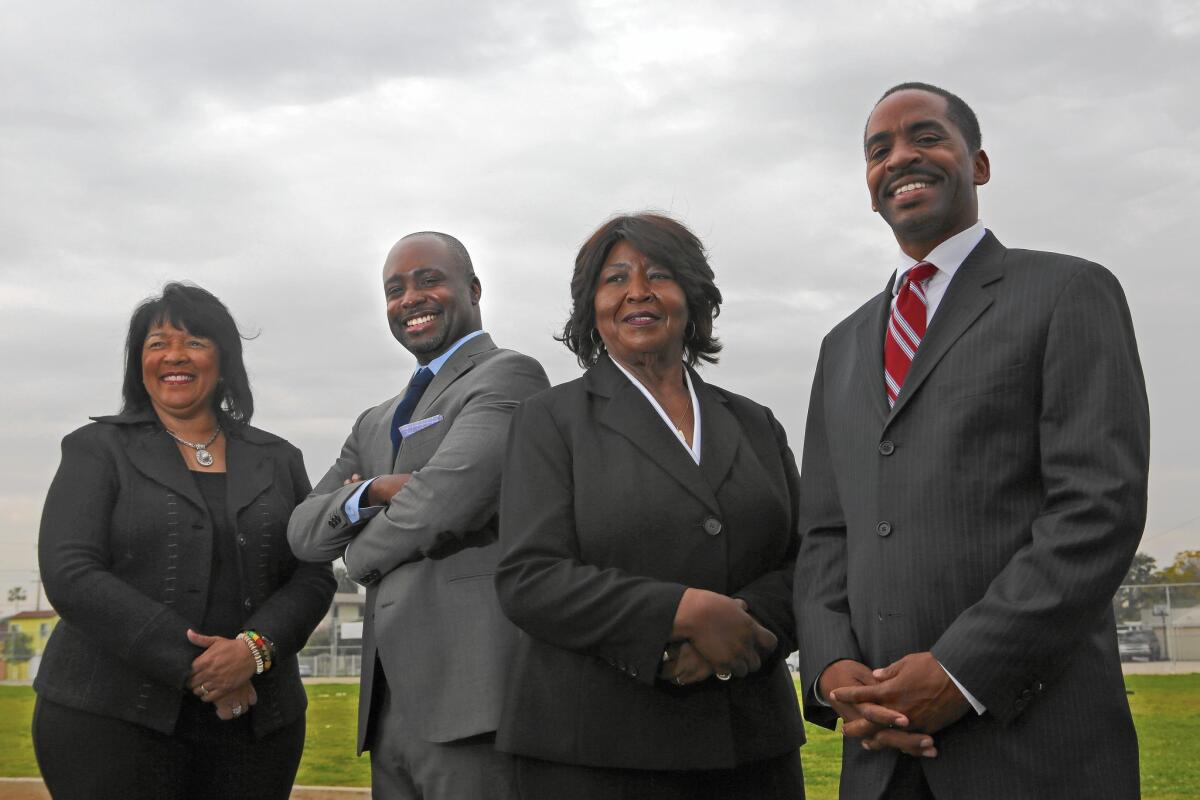
Sales clerk Nicole Daniels leans over the glass countertop at A-1 Wireless and ticks off what the four candidates competing to replace retiring City Councilman Bernard C. Parks should focus on.
Children in her South Los Angeles neighborhood need more after-school activities to combat the allure of gangs, she says. She’d like to see a Wal-Mart and more grocery stores nearby. She thinks major boulevards should be spruced up with the kind of landscaping she’s seen in other parts of the city.
------------
FOR THE RECORD:
City Council race: In the Feb. 15 California section, an article about the District 8 Los Angeles City Council race said that candidate Marqueece Harris-Dawson had been endorsed by county Supervisor Mark Ridley-Thomas. It is state Assembly member Sebastian Ridley-Thomas, the supervisor’s son, who has endorsed Harris-Dawson. Mark Ridley-Thomas has not endorsed in the race. —
------------
Most of all, Daniels says, the next council representative shouldn’t focus on pet projects but on bringing good-paying jobs and addressing the basic needs of a district still shaking off the effects of riots more than two decades ago.
“We don’t need an NFL team,” she says. “We need help in our neighborhoods.”
The stakes of this election go beyond District 8. Parks, a former Los Angeles Police Department chief, has loomed as a major force at City Hall. He’s been a leading voice of fiscal conservatism on the Council and battled with the labor unions, which hold influential sway in city politics. It remains far from clear whether the person who replaces him will continue to carry that mantle. In fact, the campaign has focused more on issues closer to home.
Each of the four candidates seeking to replace Parks in District 8 say they have plans to revitalize business corridors, clean up blight and bring down high unemployment in the narrow, densely populated region west of the 110 Freeway and stretching from the 10 Freeway south to Imperial Highway. All four candidates are African American in a district where 67% of registered voters are black and 25% are Latino.
Community organizer Marqueece Harris-Dawson, 45, has carved out a lead in fundraising and is backed by several major unions, L.A. County Supervisor Mark Ridley-Thomas, U.S. Rep. Karen Bass and much of the City Hall political establishment.
Nonprofit executive Forescee Hogan-Rowles, 57, nearly forced Parks into a runoff four years ago with the financial and political muscle of labor unions. Much of that union money has now shifted to Harris-Dawson.
Bobbie Jean Anderson, 76, has the backing of the local Democratic Party, U.S. Rep. Maxine Waters, former Councilwoman Jan Perry, Parks and SEIU 721, one the largest labor unions in the city.
Robert Cole, 49, a political consultant and former president of the Baldwin Hills Homeowners Assn., could be a wild card because he’s expected to draw strong support from the well-to-do Baldwin Hills area, where turnout is usually higher.
Each of the candidates takes a different approach to how they would revitalize the district. But all say, more or less, that they view the city’s powerful labor unions as important partners in helping spur the economy. That’s a marked difference from the district’s incumbent, widely seen as the lone labor antagonist on the 15-member City Council.
Whoever wins will face the task of repairing City Hall relations frayed by Parks, who challenged his colleagues, battled unions and has frequently been on the losing end of lopsided votes, particularly on labor issues.
None of the four are as well known as Parks, who was the city’s retired police chief when he won his first term in 2003. But each has pockets of support that could prove critical in winning the March 3 primary.
“Everyone in the race is competitive,” said Raphael Sonenshein, director of the Pat Brown Institute for Political Affairs at Cal State Los Angeles. “These are strong candidates in a high-interest and high-involvement district with well-known endorsers on each side.”
Luring private investment could be a challenge in a community where a third of residents live below the federal poverty level of $24,200 for a family of four and home ownership is among the lowest in the city. Anderson, Cole and Hogan-Rowles say they would offer incentives to lure developers, including tax rebates, help with infrastructure improvements and assistance with fast-tracking projects through City Hall.
Harris-Dawson, however, takes a different approach. He says he would concentrate on removing blight and criminal activity along transit corridors, particularly Western Avenue, the district’s north-south commercial spine. He’d also push for more mixed-used development near the Expo and under-construction Crenshaw rail transit lines, replacing car lots, auto repair shops and mini-markets with housing and upscale retail.
“Why do our main corridors look so different from our residential areas?” he said. “We need to beef up tree-trimming and landscaping schedules, and we need to hold businesses accountable for cleaning up their properties.”
Anderson, Harris-Dawson and Hogan-Rowles say they see City Hall as a vital source of employment for their constituents and would partner with unions in pushing to restore 5,000 positions lost during the recession. Anderson says she’d push for any job expansion to go to “verified L.A. city residents” so that the money is spent in local neighborhoods.
After-school programs, recreational activities and senior activities have been slashed and “people are feeling it,” Anderson said. “We need a thoughtful plan to restore needed positions and services,” she said.
Cole disagrees, saying the city — facing a $165-million budget shortfall — can’t afford an expanded workforce at this time. Cole is also leery about increasing the minimum wage in Los Angeles without further study of its effects on small businesses. Harris-Dawson and Hogan-Rowles both back a hike to $15 an hour, as supported by labor and social justice groups, while Anderson backs Mayor Eric Garcetti’s plan to hike the base wage to $13.25 an hour.
Cole, who touts his upbringing in the Boy Scouts and as a Los Angeles Police Explorer, says one of his major concerns is prostitution on Figueroa and Hoover streets, near Century Boulevard.
“It breeds negativity,” Cole said, as he drove past corners where women stood trying to catch the eye of passing motorists. At night there’s drug dealing and street racing, he said.
“It allows for a climate of gang-banging and drugs,” he said. “I’ve lived in all of the district. I’m a parent and kids see these women on the corner and see it as a profession.”
All of the candidates say they are concerned about tensions that remain in the South Los Angeles community from the August police shooting of a mentally ill black man. Cole believes there are individual bad apples in the Los Angeles Police Department who fail to follow prescribed codes of conduct, while the other three view it as evidence of widespread racial profiling.
Anderson said she supports the recent move to equip all LAPD officers with body cameras and to reprimand those who step out of line. LAPD brass also needs to offer incentives to recruit more officers from South Los Angeles communities, she said.
“Clearly, we have ongoing issues that quite frankly have left many in our community distrustful of law enforcement and the judicial system,” she said.
catherine.saillant@latimes.com
More to Read
Start your day right
Sign up for Essential California for news, features and recommendations from the L.A. Times and beyond in your inbox six days a week.
You may occasionally receive promotional content from the Los Angeles Times.

